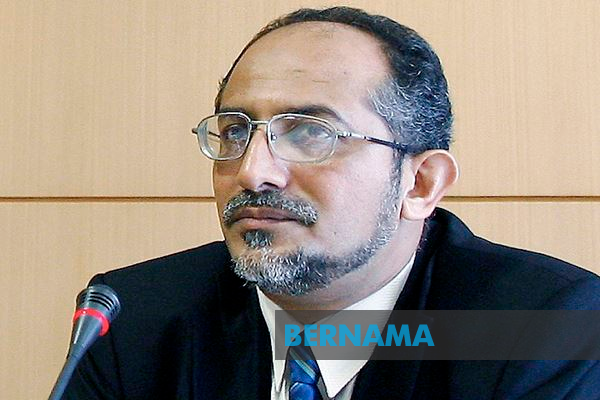News
MPOB clarifies plantation in Kuala Koh is MSPO-certified, meets all criteria

KUALA LUMPUR, Sept 27 -- The Malaysian Palm Oil Board (MPOB) has clarified that there is only one company that owns an oil palm plantation in Kuala Koh and it is Malaysian Sustainable Palm Oil (MSPO) certified besides meeting all the criteria under the scheme.
Director-general Dr Ahmad Parveez Ghulam Kadir said based on its record and ground information, the plantation covers 196 hectares and is planted on a previously logged-over forest area.
"The oil palm cultivation has been providing socio-economic activities including job opportunities for the rural population.
"Under the certification system, which adopts Good Agriculture Practices (GAP), the oil palm plantation must also comply with (guidelines on) chemical and waste management, and hence the plantation’s operation does not affect the waterways and the river," he said in a statement.
This statement came after a recent news report implicating an oil palm plantation as one of the contributors to the disease which led to several deaths of the Orang Asli from the Bateq tribe in their Kuala Koh settlement last May.
Ahmad Parveez said the plantation obtained its MSPO certificate on July 8, 2019 and was undergoing an auditing process early this year.
"The Malaysian palm oil industry has on record some of the best-documented practices by any local industry to mitigate and minimise its own environmental impacts.
"Every single oil palm-planted area is highly regulated and subjected to a number of government legislations, including that all oil palm plantations and smallholders on legitimate agricultural land do not involve deforestation of its precious rainforests," he said.
Among major environmental laws in place that demonstrate Malaysia’s concern for environmental conservation include the Land Conservation Act 1960, Environmental Quality Act 1974, Pesticides Act 1974, National Parks Act 1984, and Environmental Quality Act 1986.
Malaysia is also a signatory to the Convention on Biological Diversity 1992, International Tropical Timber Agreement and Charter of the Indigenous – Tribal Peoples of Tropical Forests.
“This has resulted in an industry that is both compliant and works hard to minimise pollution to the environment while protecting the rights of the indigenous people and the wildlife in Malaysia’s rich rainforests,” he said.
Malaysia has adopted several key policies to ensure sustainable oil palm cultivation, including capping the total oil palm cultivated area to 6.5 million hectares, halting the planting of oil palm in peatland areas, and strengthening regulations concerning existing oil palm cultivation on peat, he pointed out.
Malaysia has also banned the conversion of forest reserve areas for oil palm cultivation and made a pledge to make oil palm maps available for public access.
The country is committed to maintaining at least 50 per cent of land under forest and green cover.
In 2017, it was reported that 55.6 per cent of Malaysia’s 33 million hectares of land area was under forest cover.
Additionally, Malaysia has a years-long commitment to sustainability, minimising carbon dioxide emissions, and adopting agricultural practices that conserve the rainforests, wildlife and biodiversity, he said.
“The Malaysian producers of palm oil, in cooperation with the government, have also exhibited a strong commitment to zero-burning replanting techniques, protecting species such as orangutans, and the certification of palm oil from established, licensed plantations.
“Being a perennial tree crop cultivated in the tropical areas, there is far greater biodiversity in oil palm plantations than in the case of annual cereals, vegetables and other short-term cropping systems of the world,” Ahmad Parveez added.
He noted that a typical oil palm plantation teems with species of flora and fauna, which include microbes, insects, arthropods, reptiles, fish, birds and small mammals.
-- BERNAMA
Other News
Sarawak Lepasi Sasaran Kapasiti Gabungan Tenaga Boleh Baharu Tahun Ini - Abang Johari

Oleh Nur Ashikin Abdul Aziz
SINGAPURA, 21 Okt (Bernama) -- Sarawak mencapai 62 peratus sasaran campuran kapasiti tenaga boleh baharu (TBB) tahun ini, melepasi sasaran 60 peratus yang digariskan dalam Strategi Pembangunan Pasca COVID-19 (PCDS) 2030.
Sarawak Pacu Pertumbuhan Tenaga Boleh Diperbaharui Untuk Manfaat ASEAN - Premier

SINGAPURA, 21 Okt (Bernama) -- Sarawak komited menyokong peralihan tenaga boleh diperbaharui di Asia Tenggara dengan memanfaatkan potensinya sebagai "Bateri ASEAN," yang akan membekalkan tenaga bersih menerusi sambungan Grid Kuasa Borneo dan ASEAN.
Belanjawan 2025 Percepat Peralihan Kepada Tenaga Bersih - Solarvest

KUALA LUMPUR, 19 Okt (Bernama) -- Belanjawan 2025 merupakan satu langkah ke arah mempercepat peralihan kepada tenaga bersih di Malaysia, kata Solarvest Holdings Bhd.
© 2025 BERNAMA. All Rights Reserved.
Disclaimer | Privacy Policy | Security Policy This material may not be published, broadcast,
rewritten or redistributed in any form except with the prior written permission of BERNAMA.
Contact us :
General [ +603-2693 9933, helpdesk@bernama.com ]
Product/Service Enquiries [ +603-2050 4466, digitalsales@bernama.com ]